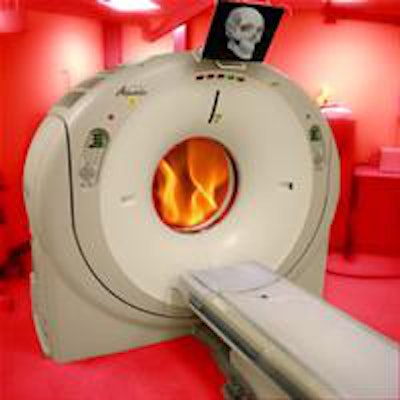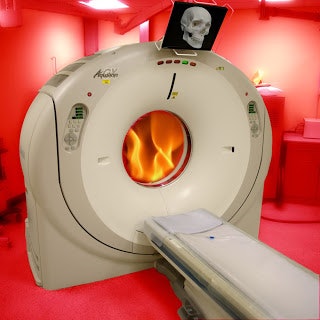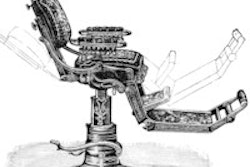
Scanners and radiologists exist in an uneasy symbiosis; one cannot function without the other. Scanners and radiologists are expensive; both need to be chosen carefully. Scanners and radiologists can malfunction; an engineer with the right spanner can usually sort one of them out. Scanners and radiologists eventually wear out; both are needlessly difficult to replace.
 Dr. Paul McCoubrie is a consultant radiologist at Southmead Hospital in Bristol, U.K.
Dr. Paul McCoubrie is a consultant radiologist at Southmead Hospital in Bristol, U.K.
In an ideal world, if the old scanner was any good, you'd simply ring up the company and order exactly the same, but more modern. There is a lot to be said for this approach -- just like the family that buys the same brand of car each time. You know what you are getting, you develop a close relationship with the local dealers, and you generally get a good price. It tends to work well.
However, this approach won't do in today's healthcare system. In the U.K. National Health Service (NHS), for instance, acquisition of new kit has to be transparent, fair, and completely above board. Choosing between different manufacturers has to be for better reasons than "we always buy one of those," "we liked the color," or "the managing director is a family friend." And to be honest, if you are responsible for spending several hundred thousand pounds (or euros) of taxpayers' money, then it is only right and fair that we procure diligently.
In recent years, my hospital has bought more than its fair share of scanners. We have a new hospital building that opens in a few months and is equipped with entirely new scanners. And, yes, I admit that there is an element of joy in getting new kit. The inner geek admires its scanning prowess, the inner aesthete admires its sleek construction, and the inner child revels in having new toys.
But the procurement of a new scanner isn't all cakes and ale: It is like pregnancy. It is a long process (and feels much longer), you can feel physically sick at times, you worry about the new baby and are never quite relaxed until it is delivered -- only to find it is a lot more complicated than you expected.
 Choosing a scanner can be devilish.
Choosing a scanner can be devilish.So here are a few hints and tips to help you through this difficult time:
Set a realistic timescale. Allow plenty of time to evaluate and chose your new scanner. On no account rush this because of extrinsic factors. Just because the money has to be "spent by the end of the financial year" is irrelevant.
Construct an objective rating scale. This may match the features of the preferred scanner but it is wise not to produce a facsimile of its operating specifications.
Don't believe the brochure. Of course they'll show the best images produced by that scanner. You have to go and see it in action.
Watch out for flattery and bribery. The more the beautiful sales rep laughs at your jokes and the more expensive the meal you are treated to, the less you should buy their scanner. A good scanner should sell itself.
Avoid technological innovation. It is very tempting to look at a new feature as inherently better. Innovation is a value-laden term: "early adopters" are groovy and cutting-edge. Or at least that is what the scanner sales team wants you to believe. Be a "late adopter;" stick to proven and mature technology.
Beware of the bells and whistles. The assumption is that the more features a scanner has, the better it will work. In reality, 95% of scanner use is pressing no more than five different buttons. Complex stuff gets ignored or often just doesn't work.
At the end of this long process of visits and evaluations, the manufacturers will make formal offers, which is when it gets quite exciting. After this lengthy period of "techno-lusting," the decision time is nigh. At which point, your manager secretly throws all the evaluation out of the window and buys the cheapest scanner.
Dr. Paul McCoubrie is a consultant radiologist at Southmead Hospital in Bristol, U.K.
The comments and observations expressed herein do not necessarily reflect the opinions of AuntMinnieEurope.com, nor should they be construed as an endorsement or admonishment of any particular vendor, analyst, industry consultant, or consulting group.














